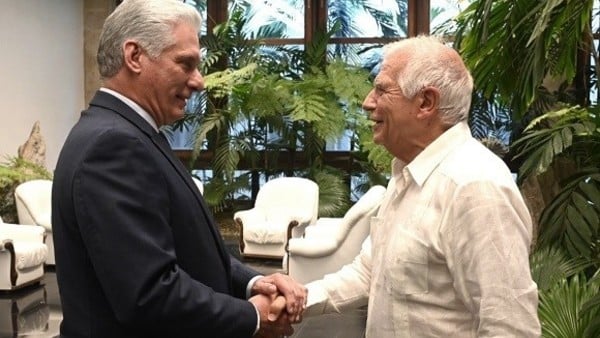Global Courant 2023-05-29 20:47:31
What was the main objective of the recent visit to Cuba by the High Representative for Foreign Policy of the European Union (EU), Josep Borrell? Pressure the Díaz-Canel dictatorship for its support for Russia in the military aggression against Ukraine?
Economic cooperation and the possibility of generating a more favorable environment for the business of European companies on the Island? Demand for the release of the more than a thousand political prisoners, the majority for having exercised the right to peaceful protest on July 11 and 12, 2021?
These three issues have probably been dealt with and in that order, but what is clear is that the EU, contrary to its own constitutive values, does not have a real commitment to the defense of human rights and the democratic opening in Cuba. Otherwise, the firm position of one of its 27 member countries, Lithuania, should be the rule rather than the exception.
Without having an embassy in Havana, Lithuania is the EU country that best understands the political reality of Cuba. Indeed, two weeks before the impressive popular protests that began on June 11, 2021, repressed in the best Latin American fascist military dictatorship style and with Miguel Díaz-Canel’s “combat order” against the protesters broadcast on TV, the Lithuanian Parliament approved, with a large majority and no votes against, a draft resolution “On the Republic of Cuba” in which he reiterated “that it is not politically appropriate to ratify the EU-Cuba Political Dialogue and Cooperation Agreement.”
Among the foundations of the project of the Lithuanian parliament it was expressed that “in addition to minor changes in some government posts due to generational replacement, the reform of the centralized economy in the Republic of Cuba has not been carried out and totalitarian measures have not been abandoned of police and justice, but have even been strengthened”; and highlighted “that the continuous and severe repression of the regime of the Republic of Cuba against the freedom of thought, expression, press, circulation, association, academic research, religion and other freedoms is a great challenge for the governments of the democracies that have applied the presumption of innocence to the Government of the Republic of Cuba”.
The Seimas of the Republic of Lithuania already observed then a “great knowledge of the new forms of destructive activities of the post-communist Russian Federation and its allies against neighboring states and Western democracies” and that “the Government of the Republic of Cuba continues to being one of his closest allies.”
The Lithuanian parliament also highlighted on Cuba the rise of a “militaristic monopoly of various military-controlled corporations in the country, GAESA (Group of Armed Forces Commercial Enterprises), which acts as a shadow mafia state within the state, not controlled by any other state institution”; and that “the Cuban state controls most of the country’s economy and almost all of its hard-won economic activities, including communications, tourism, remittances and human trafficking, Cuban professionals, particularly so-called medical teams ”.
Can the EU Foreign Service ignore what was expressed by the Lithuanian Parliament a week and a half before the largest popular protests in Cuba?
The EU has an intelligence office that must be aware of Cuba about what the Lithuanian parliament warned. Likewise, since the signing of the Political Dialogue and Cooperation Agreement between the EU and Cuba, the Caribbean country has seen significant setbacks in terms of human rights, such as the constitutional rank of the single party in 2019, the adoption of a new penal code that increased the death penalty to 29 crimes, imprisonment and forced exile.
If the dialogue includes human rights, then it is clear that the Cuban government makes obscene mockery of it and that the EU’s ability to influence is nil, despite the millions of euros it contributes in terms of cooperation.
The problem then is the lack of political will and the negative leadership that Spain has within the EU in policy towards Cuba. Indeed, those who manage the relationship with Cuba in the EU, mainly economic cooperation, are Community diplomats of Spanish nationality with a political bias more aligned with the dictatorship than with its victims.
For this reason, the most logical thing to prioritize the values of the EU in its relationship with Cuba -including the application of the directive of September 12, 2012 – “The roots of democracy and sustainable development: Europe’s commitment to civil society in foreign relations” – is that the leadership is in the hands of countries that have lived through a similar totalitarian regime, such as Lithuania and the Czech Republic, or that have been taking positions that are more sensitive and committed to human rights in Cuba, such as the countries Netherlands and Sweden.
If, in a sort of neocolonialism, the EU’s relationship with Cuba continues to be led by Spain, either with its nostalgic socialists or with its pro-business right, then the European community bloc will be contributing as much to the political opening of the Caribbean island as the United States does with its failed and populist economic embargo.
Gabriel C. Salvia is General Director of CADAL (www.cadal.org) and compiler of the book “75 years of the Universal Declaration of Human Rights: Perspectives from Cuba” (CADAL, 2023).








